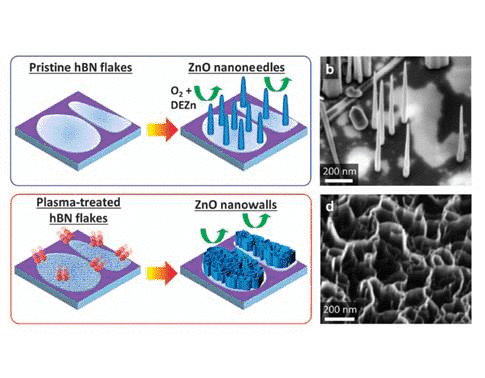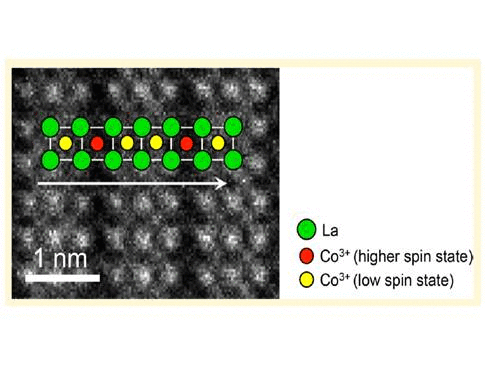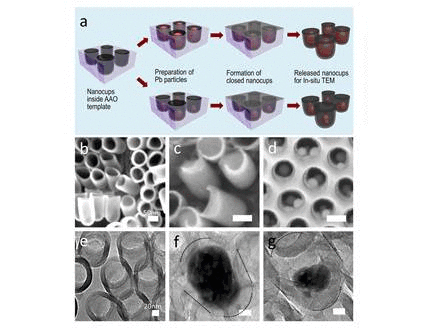Table of Contents
Other Research
We are also performing our research on various interesting problems.
van der Waals epitaxy of ZnO on hBN

Integration of semiconductor on 2D atomic layers has offered flexible optoelectronic devices. Among various 2D atomic layers BN has great potentials for diverse device applications due to its excellent thermal conductivity and chemical stability as a wide-bandgap electric insulator. We found ZnO and BN were interacted through van der waals interaction using aberration-corrected high resolution transmission electron microscopy (HR-TEM) and ab initio calculations based on density function theory (DFT). We used DFT-D2 method of Grimme to describe London dispersion interactions.
- Architectured van der Waals epitaxy of ZnO nanostructures on hexagonal BN
Hongseok Oh, Young Joon Hong, Kun-Su Kim, Sangmoon Yoon, Hyeonjun Baek, Seoung-Hun Kang, Young-Kyun Kwon, Miyoung Kim, and Gyu-Chul Yi, NPG Asia Mater. 6, e145 (2014).
link:
 download:
download: 


LCO

The nature of magnetic ordering in LaCoO3 epitaxial thin
films has been the subject of considerable debate. We present direct
observations of the spin-state modulation of Co ions in
LaCoO3 epitaxial thin films on an atomic scale using
aberration-corrected scanning transmission electron microscopy (STEM),
electron energy loss spectroscopy (EELS), and ab initio calculations
based on density functional theory (DFT) calculations. The results of
an atomic-resolution STEM/EELS study indicate that the superstructure
is not associated with oxygen vacancies; rather, it is associated with
a higher spin state of Co3+ ions and their
ordering. DFT calculations successfully reproduced the modulation of
lattice spacing with the introduction of spin ordering. This result
identifies the origins of intrinsic phenomena in strained
LaCoO3 and provides fundamental clues for understanding
ferromagnetism in Co-base oxides.
- Nanoscale Spin-State Ordering in LaCoO3 Epitaxial Thin Films
Ji-Hwan Kwon, Woo Seok Choi, Young-Kyun Kwon, Ranju Jung, Jian-Min Zuo, Ho Nyung Lee and Miyoung Kim, Chem. Mater. 26 (8), 2496-2501 (2014).
link: download:
download: 


Liquid metal nanodroplet dynamics inside nanocontainer

Here we report direct observations of spatial movements of
nanodroplets of Pb metal trapped inside sealed carbon nanocontainers.
We find drastic changes in the mobility of the liquid droplets as the
particle size increases from a few to a few ten nanometers. In open
containers the droplet becomes immobile and readily evaporates to the
vacuum environment. The particle mobility strongly depends on
confinement, particle size, and wetting on the enclosed surface. The
collisions between droplets increase mobility but the tendency is
reversed if collisions lead to droplet coalescence. The dynamics of
confined nanodroplets could provide new insights into the activity of
nanostructures in spatially constrained geometries.
Econophysics
The assessment of information transfer in the global economic network helps to understand the current environment and the outlook of an economy. Most approaches on global networks extract information transfer based mainly on a single variable. This paper establishes an entirely new bioinformatics-inspired approach to integrating information transfer derived from multiple variables and develops an international economic network accordingly. In the proposed methodology, we first construct the transfer entropies (TEs) between various intra- and inter-country pairs of economic time series variables, test their significances, and then use a weighted sum approach to aggregate information captured in each TE. Through a simulation study, the new method is shown to deliver better information integration compared to existing integration methods in that it can be applied even when intra-country variables are correlated. Empirical investigation with the real world data reveals that Western countries are more influential in the global economic network and that Japan has become less influential following the Asian currency crisis.
- Entropy-Based Analysis and Bioinformatics-Inspired Integration of Global Economic Information Transfer
Jinkyu Kim, Gunn Kim, Sungbae An, Young-Kyun Kwon, and Sungroh Yoon, PLoS One 8 (1), e51986 (2013).
link:
 download:
download: 

